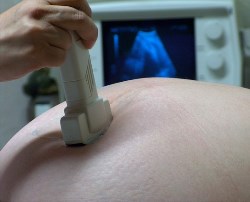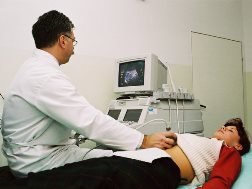How to Pick the Right Sonogram Technician College near Little River Alabama
 Since you have made a decision to obtain an ultrasound technician degree near Little River AL, it’s time to begin the procedure of choosing a college. To begin with, you need to find the right program that will furnish the necessary instruction to become a qualified professional. And because a number of states do mandate that sonographers be either certified or licensed, depending on where you will practice you may also need preparation to pass a certification or licensing examination. So it’s very important that you research each college in order to evaluate and compare your alternatives. But just where does one start? Most potential students will start by searching for schools that are within commuting distance of their residences and then by comparing tuition. Naturally location and cost must be taken into account when making a decision, but there are other important factors as well. Such as, if the ultrasound technician schools are accredited or if they offer internships. These and other qualifiers will be discussed more in detail later in this article. But to start with, let’s review what an ultrasound tech does and the degrees and online education options that are offered.
Since you have made a decision to obtain an ultrasound technician degree near Little River AL, it’s time to begin the procedure of choosing a college. To begin with, you need to find the right program that will furnish the necessary instruction to become a qualified professional. And because a number of states do mandate that sonographers be either certified or licensed, depending on where you will practice you may also need preparation to pass a certification or licensing examination. So it’s very important that you research each college in order to evaluate and compare your alternatives. But just where does one start? Most potential students will start by searching for schools that are within commuting distance of their residences and then by comparing tuition. Naturally location and cost must be taken into account when making a decision, but there are other important factors as well. Such as, if the ultrasound technician schools are accredited or if they offer internships. These and other qualifiers will be discussed more in detail later in this article. But to start with, let’s review what an ultrasound tech does and the degrees and online education options that are offered.
Click Here to Get Free Information on Ultrasound Technician Schools!
Ultrasound Tech Job Description
 There are more than one acceptable titles for ultrasound techs (technicians). They are also called sonogram techs, diagnostic medical sonographers (or just sonographers) and ultrasound technologists. No matter what their title is, they all have the same basic job description, which is to implement diagnostic ultrasound procedures on patients. While many work as generalists there are specialties within the profession, for example in pediatrics and cardiology. The majority work in Little River AL clinics, hospitals, private practices or outpatient diagnostic imaging centers. Common daily work duties of an ultrasound tech can involve:
There are more than one acceptable titles for ultrasound techs (technicians). They are also called sonogram techs, diagnostic medical sonographers (or just sonographers) and ultrasound technologists. No matter what their title is, they all have the same basic job description, which is to implement diagnostic ultrasound procedures on patients. While many work as generalists there are specialties within the profession, for example in pediatrics and cardiology. The majority work in Little River AL clinics, hospitals, private practices or outpatient diagnostic imaging centers. Common daily work duties of an ultrasound tech can involve:
- Maintaining records of patient medical histories and specifics of each procedure
- Counseling patients by explaining the procedures and answering questions
- Readying the ultrasound machines for use and then sterilizing and recalibrating them
- Transferring patients to treatment rooms and making them comfortable
- Operating equipment while limiting patient exposure to sound waves
- Evaluating results and determining necessity for additional testing
Ultrasound techs must frequently assess the performance and safety of their machines. They also are held to a high ethical standard and code of conduct as health practitioners. So as to maintain that degree of professionalism and remain current with medical knowledge, they are mandated to enroll in continuing education training on an ongoing basis.
Sonogram Technician Degree Programs Available
 Sonogram technician enrollees have the choice to earn either an Associate Degree or a Bachelor’s Degree. An Associate Degree will normally involve around 18 months to 2 years to accomplish dependent on the course load and program. A Bachelor’s Degree will take longer at as long as 4 years to finish. Another option for individuals who have previously received a college degree is a post graduate certificate program. If you have earned a Bachelor’s Degree in any major or an Associate Degree in a related health field, you can instead choose a certificate program that will require only 12 to 18 months to complete. One thing to bear in mind is that most sonographer colleges do have a clinical training component as a portion of their course of study. It can often be fulfilled by entering into an internship program which many schools set up through Little River AL clinics and hospitals. When you have graduated from any of the certificate or degree programs, you will then have to satisfy the licensing or certification prerequisites in Alabama or whichever state you decide to practice in.
Sonogram technician enrollees have the choice to earn either an Associate Degree or a Bachelor’s Degree. An Associate Degree will normally involve around 18 months to 2 years to accomplish dependent on the course load and program. A Bachelor’s Degree will take longer at as long as 4 years to finish. Another option for individuals who have previously received a college degree is a post graduate certificate program. If you have earned a Bachelor’s Degree in any major or an Associate Degree in a related health field, you can instead choose a certificate program that will require only 12 to 18 months to complete. One thing to bear in mind is that most sonographer colleges do have a clinical training component as a portion of their course of study. It can often be fulfilled by entering into an internship program which many schools set up through Little River AL clinics and hospitals. When you have graduated from any of the certificate or degree programs, you will then have to satisfy the licensing or certification prerequisites in Alabama or whichever state you decide to practice in.
Sonographer Online Programs
 As earlier discussed, nearly all ultrasound tech colleges have a practical requirement to their programs. So while you can earn a degree or certificate online, a significant portion of the training will be either carried out in an on-campus lab or at an authorized off campus facility. Clinical training can often be fulfilled by means of an internship at a local Little River AL hospital, outpatient clinic or private practice. However the rest of the training and classes can be accessed online in your Little River home. This is particularly convenient for those individuals that continue working while obtaining their degrees. In addition online colleges are often less expensive than on campus alternatives. Expenses for study materials and commuting can be reduced as well. But similarly as with any sonography school you are reviewing, check that the online program you select is accredited. One of the most highly respected accrediting organizations is the Commission on Accreditation of Allied Health Education Programs (CAAHEP). Accreditation is particularly crucial for certification, licensing and job placement (more on accreditation later). So if you are motivated enough to attend classes outside of the classroom in the comfort of your own home, then online classes could be the right option for you.
As earlier discussed, nearly all ultrasound tech colleges have a practical requirement to their programs. So while you can earn a degree or certificate online, a significant portion of the training will be either carried out in an on-campus lab or at an authorized off campus facility. Clinical training can often be fulfilled by means of an internship at a local Little River AL hospital, outpatient clinic or private practice. However the rest of the training and classes can be accessed online in your Little River home. This is particularly convenient for those individuals that continue working while obtaining their degrees. In addition online colleges are often less expensive than on campus alternatives. Expenses for study materials and commuting can be reduced as well. But similarly as with any sonography school you are reviewing, check that the online program you select is accredited. One of the most highly respected accrediting organizations is the Commission on Accreditation of Allied Health Education Programs (CAAHEP). Accreditation is particularly crucial for certification, licensing and job placement (more on accreditation later). So if you are motivated enough to attend classes outside of the classroom in the comfort of your own home, then online classes could be the right option for you.
Points to Ask Sonogram Tech Schools
 Once you have determined the type of certificate or degree that you would like to earn, you can initiate the process of evaluating and comparing ultrasound tech colleges. You may first want to decide whether you will access classes online or travel to a school campus in the Little River AL area. Clearly location will be critical if you choose the latter, and the cost of tuition no doubt will be an initial qualifier as well. But there are additional factors that you should also take into account, for example if the colleges are accredited and if they offer internship programs. So in order to perform your due diligence so that you can arrive at your final selection, following are a few questions that you need ask each ultrasound tech school before deciding.
Once you have determined the type of certificate or degree that you would like to earn, you can initiate the process of evaluating and comparing ultrasound tech colleges. You may first want to decide whether you will access classes online or travel to a school campus in the Little River AL area. Clearly location will be critical if you choose the latter, and the cost of tuition no doubt will be an initial qualifier as well. But there are additional factors that you should also take into account, for example if the colleges are accredited and if they offer internship programs. So in order to perform your due diligence so that you can arrive at your final selection, following are a few questions that you need ask each ultrasound tech school before deciding.
Are the Ultrasound Technician Colleges Accredited? Most ultrasound tech schools have earned some form of accreditation, whether regional or national. However, it’s still crucial to confirm that the school and program are accredited. Among the most highly regarded accrediting organizations in the field of sonography is the Joint Review Committee on Education in Diagnostic Medical Sonography (JRC-DMS). Schools earning accreditation from the JRC-DMS have gone through a detailed examination of their instructors and educational materials. If the school is online it may also earn accreditation from the Distance Education and Training Council, which focuses on online or distance education. All accrediting agencies should be acknowledged by the U.S. Department of Education or the Council on Higher Education Accreditation. Along with guaranteeing a quality education, accreditation will also assist in obtaining financial assistance and student loans, which are many times not offered for non-accredited colleges. Accreditation can also be a pre-requisite for licensing and certification as required. And many Little River AL employers will only hire a graduate of an accredited school for entry-level jobs.
Are Internships Offered? Ask if the sonogram tech programs you are reviewing have associations with Little River AL clinics or hospitals for internship programs. Internships are not only an excellent manner to receive practical experience in a clinical environment, they are also a means to satisfy the clinical training requirement for most programs. As an ancillary benefit, they may help students and graduates develop professional connections in the Little River health care community and help with job placement.
Is Job Placement Help provided? You will undoubtedly wish to hit the ground running after graduating, but getting that first job in a new field can be challenging without support. Find out if the ultrasound tech schools you are assessing have job placement programs and what their success rates are. High and rapid placement rates are an excellent indication that the schools have sizable networks and good relationships with Alabama healthcare employers. It also substantiates that their graduates are highly regarded and sought after.
Where is the School Located? For a number of students, the college they decide on will need to be within travelling distance of their Little River AL home. Students who have decided to attend online classes obviously will not have to worry themselves with the location of the campus. However, the availability of local internships will be of importance. One thing to keep in mind is that if you choose to enroll in a school that is out of state or even out of your local area, you might have to pay a higher tuition. State colleges typically charge higher tuitions for out of state residents. And community colleges often charge a higher tuition for those students that live outside of their districts.
How Large are the Classes ? Unless you are the sort of person that likes to sit far in the rear of the classroom or get lost in the crowd, you will probably prefer a small class size. Smaller classes allow for more individual participation and personalized instruction. Ask the schools you are considering what the typical student to teacher ratio is for their classes. If practical you may want to sit in on one or more classes before making your final decision. This will also give you an opportunity to speak with several of the instructors and students to get their perspectives regarding the sonogram tech program as well.
Can the School Accommodate your Schedule? And last you need to confirm that the ultrasound tech school you finally choose can furnish the class schedule you need. This is especially crucial if you decide to continue working while attending school. If you must schedule night or weekend classes in the Little River AL area, make certain that they are available. If you can only enroll on a part-time basis, verify if that is an alternative and how many credit hours or courses you would need to enroll in. Also, learn what the protocol is for making up any classes that you might miss because of illness, work or family emergencies.
Ultrasound College Programs Little River Alabama
 Choosing the right sonographer certificate or degree program is an important first step to launching a rewarding new profession providing diagnostic services to patients. Ultrasound technician schools require that you have earned a high school diploma or a GED. Apart from meeting academic requirements, you should be in at least fairly good physical condition, able to stand for prolonged time frames and able to routinely lift weights of fifty pounds or more, as is it typically necessary to position patients and maneuver heavy machines. Additional helpful skills include technical aptitude, the ability to remain calm when confronted by an angry or anxious patient and the ability to converse in a clear and compassionate manner. You originally came to this website due to an interest in Ultrasound College Programs and wanting more information on Ultrasound Tech Classes. However, as we have discussed in this article, there are multiple questions that you need to ask each school you are considering. This is true whether you choose an online degree or commute to the college campus to attend classes. And by asking the appropriate questions so that you can compare each program, you will be able to narrow down your options until you are left with the ideal school for your education. And with the right training, dedication and determination to succeed, you can reach your objective to practice as an sonographer in Little River AL.
Choosing the right sonographer certificate or degree program is an important first step to launching a rewarding new profession providing diagnostic services to patients. Ultrasound technician schools require that you have earned a high school diploma or a GED. Apart from meeting academic requirements, you should be in at least fairly good physical condition, able to stand for prolonged time frames and able to routinely lift weights of fifty pounds or more, as is it typically necessary to position patients and maneuver heavy machines. Additional helpful skills include technical aptitude, the ability to remain calm when confronted by an angry or anxious patient and the ability to converse in a clear and compassionate manner. You originally came to this website due to an interest in Ultrasound College Programs and wanting more information on Ultrasound Tech Classes. However, as we have discussed in this article, there are multiple questions that you need to ask each school you are considering. This is true whether you choose an online degree or commute to the college campus to attend classes. And by asking the appropriate questions so that you can compare each program, you will be able to narrow down your options until you are left with the ideal school for your education. And with the right training, dedication and determination to succeed, you can reach your objective to practice as an sonographer in Little River AL.
More Ultrasound Locations in Alabama
Little Zab
The Little Zab or Lower Zab (Arabic: الزاب الاسفل, al-Zāb al-Asfal; Kurdish: Zêy Koya or Zêyê Biçûk; Persian: زاب کوچک, Zâb-e Kuchak; Syriac: ܙܒܐ ܬܚܬܝܐ, Zāba Taḥtāya) originates in Iran and joins the Tigris just south of Al Zab in the Kurdistan region of Iraq. The river is approximately 400 kilometres (250 mi) long and drains an area of about 22,000 square kilometres (8,500 sq mi). The river is fed by rainfall and snowmelt, resulting in a peak discharge in spring and low water in summer and early fall. Two dams have been built on the Little Zab, regulating the river flow, providing water for irrigation and generating hydroelectricity. The Zagros Mountains have been occupied since at least the Lower Palaeolithic, but the earliest archaeological site in the Little Zab basin, Barda Balka, dates to the Middle Palaeolithic. Human occupation of the Little Zab basin has been attested for every period since then.
The Little Zab rises in the Zagros Mountains in Iran at an elevation of circa 3,000 metres (9,800 ft) amsl.[2] In its upper reaches, the course of the Little Zab is determined by the alignment of the major mountain chains that make up the Zagros. Thus, the river flows through valleys that are predominantly aligned along a northwest–southeast axis, parallel to the major mountain chains of the Zagros, only to change its direction abruptly where it cuts through these chains in narrow gorges.[3] The Little Zab enters the plain south of Dukan, where it first assumes a roughly westward course before turning to the southwest upstream from the town of Altun Kopru and uniting with the Tigris near the town of Al Zab.[4] Most tributaries join the Little Zab upstream from Dukan, with the largest being the Baneh River and the Qala Chulan.[3] A number of smaller streams joined the Little Zab in the Ranya Plain, which is now partly inundated by Lake Dukan.[5]
Different estimates have been given for the length of the Little Zab: 380 kilometres (240 mi),[6] 400 kilometres (250 mi)[7] and 456 kilometres (283 mi).[2][8] For a short distance, the Little Zab forms the border between Iran and Iraq, and along its lower course it also constitutes the border between Erbil Governorate and Sulaymaniyah Governorate, and Erbil and Kirkuk Governorates. The river is fed by snowmelt and rainfall, resulting in a peak discharge in the period February–May. Low water levels are recorded for the period July–October. The average discharge of the Little Zab is 197.8 cubic metres (6,990 cu ft) per second, whereas the maximum recorded discharge is 3,420 cubic metres (121,000 cu ft) per second. Average annual discharge is 7.2 cubic kilometres (1.7 cu mi).[7][9][10] Because of its torrential nature, Medieval Arab geographers have described the Little Zab, and the Great Zab as well, as "demoniacally possessed".[1]
